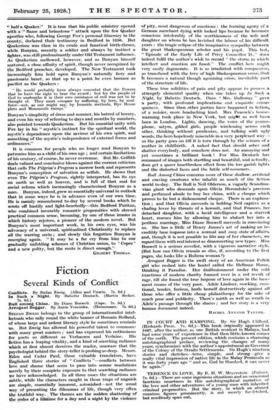Fiction
Several Kinds of Conflict
Conflicts. By Stefan Zweig. (Allen and Unwin. 7s. 6d.) STEFAN ZWEIG belongs to the group of internationalist intel- lectuals who rally round the white banner of Romain Rolland, of whose large and ardent literary style he sometimes reminds us. But Zweig has allowed his powerful talent to commune with many great masters ; and has expressed his enthugiaim for poets so different as Verhaeren and Verlaine. His fiction has a leaping vitality, and a kind of searching radiance which at first almost deceives the reader, unaware that the psychologist behind the story-teller is probing so deep. Messrs. Eden and Cedar Paul, those valuable translators, have Pnglished three stories of " Conflicts "—conflicts between love and shame that seem to pass into serene resolutions merely by their complete exposure to that searching radiance Nye have acknowledged. In all three cases the situations are subtle, while the characters caught in those traps of anguish are simple, essentially innocent, astonished—not the usual way of presenting the dilemmas of life, though very often the truthful way. The themes are the sudden shattering of the codes of a lifetime for a day and a night by the violence of pity, most dangerous of emotions : the burning agony el' a German merchant dying with locked lips because he becomes conscious intolerably of the worthlessness of the wife and daughter on whom he has lavished the labour of his difficult years : the tragic eclipse of the imaginative sympathy between the great Shakespearean scholar and his pupil. This last, " Episode of the Early Life of Privy Councillor D.," does indeed fulfil the author's wish to record " the storm in which intellect and emotion are fused." The conflict here might very easily degenerate. It is so irradiated with compassion, so transfused with the love of high Shakespearean verse, that it becomes a natural though agonizing crisis, inevitably part of the structure of life.
These true solidifies of pain and pity appear to possess a strangely elemental quality when one takes up In Such a Night, by Babette Deutsch. Once " Mrs. Dalloway " gave a party, with profound implications and exquisite conse- quences. Since then other parties have happened in fiction, of a noisier, more headaching kind. Max Peacock's house- warming took place in New York, but mien as well have been in London. Lights, dancing, the voice of the gramo- phone, satyrs, gilded girls, people wirelessing across each other, thinking without predicates, and talking with ugly words, the hero hopelessly miserable in a very perplexed way—. so the party goes on till it is torn through by the scream of a mother in childbirth. A naked fact that should sober and shatter everybody, and somehow does not. An annoying and yet sometimes a brilliant book ! For Miss Deutsch has command of images both startling and beautiful, and actually; does get a queer heartbroken effect from the too garish lights and the distorted faces and the futile self-mourners.
Bull Among China concerns more of these shallow, artificial and craving creatures who inhabit so much of the fiction world to-day. The Bull is Neil Olderson, a vaguely Scandina- vian giant who descends upon Olivia Heronduke's precious and perfumed abode to buy her china, with a cheque which proves to be but a dishonoured cheque. There is an explana- tion ; and that Olivia succeeds in holding Neil captive as a chafing lover by threats of a lawsuit, and that Frances, her detached daughter, with a lucid intelligence and a starved heart, rescues him by allowing him to abduct her into a perilous marriage, Miss Diane Boswell succeeds in convincing us. She has a little of Henry James's art of making an in- credibly base impasse into a normal and easy state of affairs, and, though it is not possible to like any of her characters, we regard them with real interest as disconcerting new types. Miss Boswell is a serious novelist, with a vigorous narrative style. (But how can Olivia remain so slim, if, according to the first pages, she looks like a Rubens woman?)
. Arrogant Beggar is the swift story of an American Polish girl who rushed into the hostel called the Hellman Home, thinking it Paradise. Her disillusionment under the cold exactions of modern charity foamed over in a red revolt of rage, till she found the true largesse of love again in the base. meet rooms of the very poor. Adele Lindner, mocking, emo- tional, tender, furious, hurls herself destructively against all those who offer a little cheap philanthropy for the sake of much pose and publicity. There's mirth as well as wrath in Adele's passage through the shams ; and her story is a very human document indeed.
RACHEL ANNAND TAYLOR.








































 Previous page
Previous page